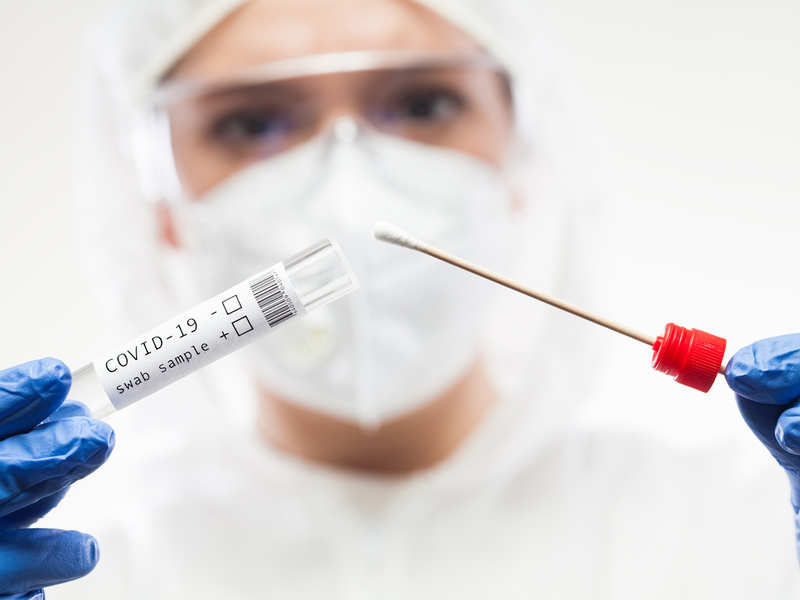

When an individual is self-testing, they’d put saliva instantly onto the check strip the place the measurement is run by the instrument and the consequence produced on a show, avoiding the discomfort related to nasopharyngeal swabs.
LONDON: Researchers are growing a fast, low-cost and mass manufacturable saliva-based biosensor check for COVID-19 impressed by the glucose test strips used to test blood sugar ranges in individuals with diabetes.
In keeping with the analysis crew from the University of Strathclyde in Scotland, the check may ultimately be mass manufactured for as little as 20 pence (Rs 19) per check. It’s designed for fast within the subject use, just like a lateral move check, to permit individuals in group settings to find out their COVID-19 standing.
When an individual is self-testing, they’d put saliva instantly onto the check strip the place the measurement is run by the instrument and the consequence produced on a show, avoiding the discomfort related to nasopharyngeal swabs.
In comparison with different diagnostic assessments, glucose blood assessments can already be manufactured at scale, with check strips and readers CE marked with regulatory approval to be used within the administration of diabetes. This implies the path to producing a COVID-19 check primarily based on the expertise will be a lot faster.
A paper printed in Royal Society of Chemistry journal ‘Chemical Communications’ , particulars how a particular chemical therapy is utilized to the sensor floor to supply the check, which makes use of the ACE2 enzyme – the receptor that coronavirus makes use of to bind on to cells – which means clinically related detection ranges of the virus will be achieved.
The crew have patented the experimental expertise, and utilizing scientific samples offered by NHS Larger Glasgow and Clyde Biorepository, will translate this proof of idea work right into a working product.
It’s being commercialised within the type of a spin out firm referred to as Aureum Diagnostics, supported by Norcliffe Capital, who will develop the check right into a CE marked industrial product for actual world use. The corporate is aiming to have a primary model of the check for emergency use prepared in 12 months and a totally CE marked check available on the market in 18-24 months.
Lead investigator, Dr Damion Corrigan from the division of Biomedical Engineering at Strathclyde, mentioned: “The check would offer a scalable path to delicate, particular, fast and low-cost testing for COVID-19, however as well as may function a low price software to quickly diagnose different respiratory viruses and decide whether or not somebody has COVID-19, flu or rhinovirus. This implies it may allow screening of staff, at very low price, for instance of their workplace, figuring out and isolating these with the illness and enabling these recovered to return to work.
“Initially, we’ll display this with COVID-19 after which commercialise the check in order that we will work on utilizing the underlying patent to supply new sensor applied sciences for different respiratory viruses and infectious illnesses.”
The crew partnered with Lifescan in Inverness, one of many world’s main producers of diabetes check strips.
Dr Corrigan, added: “Only a few different diagnostic applied sciences can compete by way of price and scale. By printing ACE2 onto the sensor, it means the strip is designed to selectively seize the coronavirus and likewise be mutation proof. The check ought to stay delicate to completely different strains of the virus not like assessments primarily based on polymerase chain response (PCR) or antibody assessments which solely search for a small a part of the viral materials.”
The experimental sensor was initially examined with inactivated virus samples at completely different concentrations, starting from low to excessive, alongside unfavourable samples from a commercially out there molecular diagnostics requirements equipment.
Hospital laboratory assessments had been then carried out on actual affected person samples offered by the NHS Larger Glasgow and Clyde Biorepository. The newest set of experiments confirmed detection was potential in quarter-hour.
Dr Michael Murphy, Guide Microbiologist within the Department of Microbiology, at Glasgow Royal Infirmary, NHS Larger Glasgow and Clyde and co-investigator on the research, mentioned: “COVID-19 has shone an enormous highlight on the necessity for fast, inexpensive diagnostic assessments produced at scale. There’s a important have to develop comparable diagnostic assessments for flu and different viral infections to assist enhance affected person care, display well being care staff and scale back the chance of hospital acquired infections.”
“At NHS Larger Glasgow and Clyde, we’re working to arrange for future pandemics by engaged on modern options to the challenges of fast diagnostics,” Dr Murphy mentioned.
FbTwitterLinkedin






